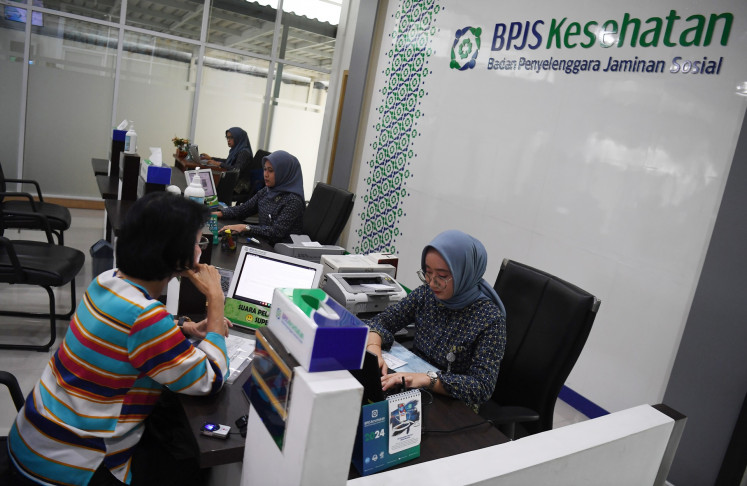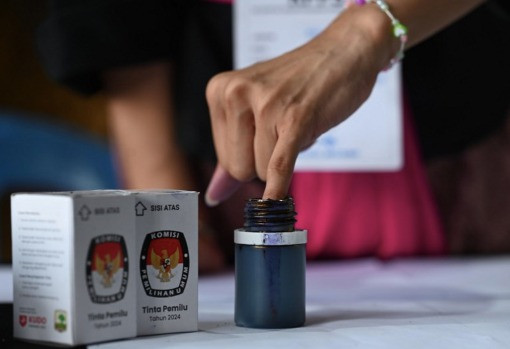Govt partners with Mastercard, NGO to launch business, cybersecurity mentoring for MSMEs
Cooperatives and Small and Medium Enterprises Minister Teten Masduki said during the launch of a mentoring program on Thursday 40,000 micro, small and medium enterprises (MSMEs) across 18 provinces nationwide would be assisted.
Change Size
 The government has partnered with financial service company PT Mastercard Indonesia and nonprofit organization Mercy Corps Indonesia for a mentoring program on business and cybersecurity for micro and small businesses.
(Shutterstock/File)
The government has partnered with financial service company PT Mastercard Indonesia and nonprofit organization Mercy Corps Indonesia for a mentoring program on business and cybersecurity for micro and small businesses.
(Shutterstock/File)
T
he government has partnered with financial service company PT Mastercard Indonesia and nonprofit organization Mercy Corps Indonesia for a mentoring program on business and cybersecurity for micro and small businesses.
Cooperatives and Small and Medium Enterprises Minister Teten Masduki said during the launch of the program on Thursday that the mentoring program would accommodate 40,000 micro, small and medium enterprises (MSMEs) across 18 provinces nationwide.
The partnership integrates the ministry’s online training platform edukukm.id with Mercy Corps Indonesia’s micromentor.org.
“I am grateful to Mastercard Indonesia and Mercy Corps Indonesia, which have provided mentoring to MSMEs that join the training on edukukm.id, so they are ready for onboarding with deeper knowledge on information technology,” Teten said at the program’s virtual launch on Thursday.
The program came after the government launched similar partnerships with e-commerce companies to encourage 10 million small businesses to go online.
With people staying at home or avoiding unessential contact, online transactions have seen a 26 percent increase from pre-pandemic times, according to Bank Indonesia data.
However, with the rise of online shopping, small businesses are prone to cyberattacks because they do not have adequate cybersecurity, especially for their own websites, according to Agrian Pangestu, cyber and intelligence product manager at Mastercard Indonesia.
The country recorded more than 88 million cyberattacks in the first four months of the year, according to the National Cyber and Encryption Agency (BSSN). More than half of the cyberattacks were malware and phishing scams.
Agrian suggested that small businesses assess the weak spots of their websites to protect consumer data, including phone numbers, addresses and financial information.
He said small businesses should prevent unauthorized apps from accessing their devices.
“We are trying to inform MSMEs about cybersecurity issues because there is a lack of awareness on this matter,” said Agrian. “Based on surveys, MSMEs think they will not get attacked because their businesses are too small. But apparently many hackers and cybercriminals want to attack MSMEs.”
Agrian also said small businesses that had joined e-commerce platforms might be more secure because they benefited from the platforms’ cybersecurity.
However, e-commerce platforms Tokopedia, Bukalapak and Bhinneka reported data breaches in May, leaving customers’ information at risk.
Despite being a home to 175.4 million internet users as of January 2020, Indonesia’s digital literacy, including awareness of online safety, is relatively low.
The Global World Digital Competitiveness Index, which includes digital literacy among other indicators, ranked Indonesia 56th out of 63 countries in 2019, far below Singapore and Malaysia, which were ranked second and 26th respectively.
Separately, financial service company Visa suggested that e-commerce companies adopt tokenization, which replaces sensitive data such as credit card numbers with tokens. This has the potential to help users protect themselves from data breaches, as hackers cannot use tokens for anything.
“Our fear is that because the merchants are new, they themselves do not have the experience or the skills or the infrastructure or the tools or systems to protect sensitive information that they capture,” Joe Cunningham, Visa’s regional risk officer for the Asia-Pacific, said in an interview with The Jakarta Post on Aug. 26.









